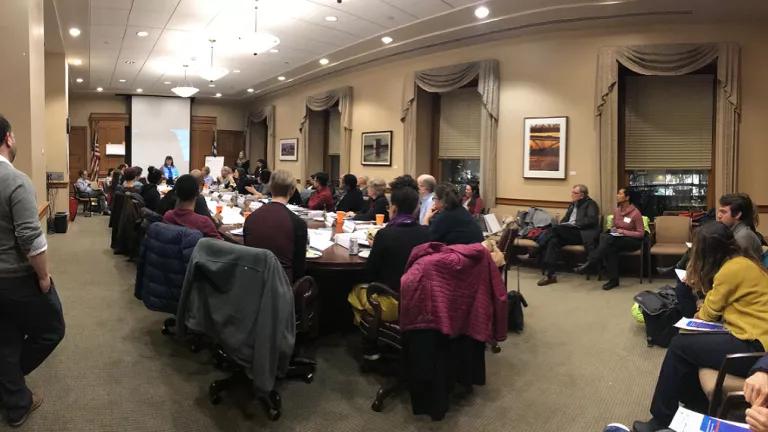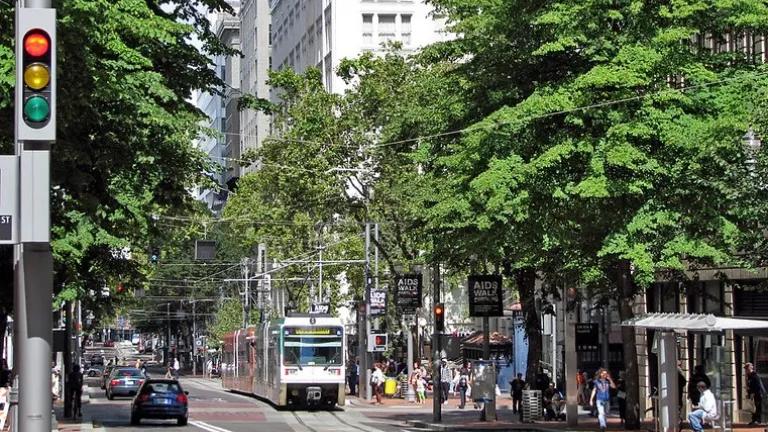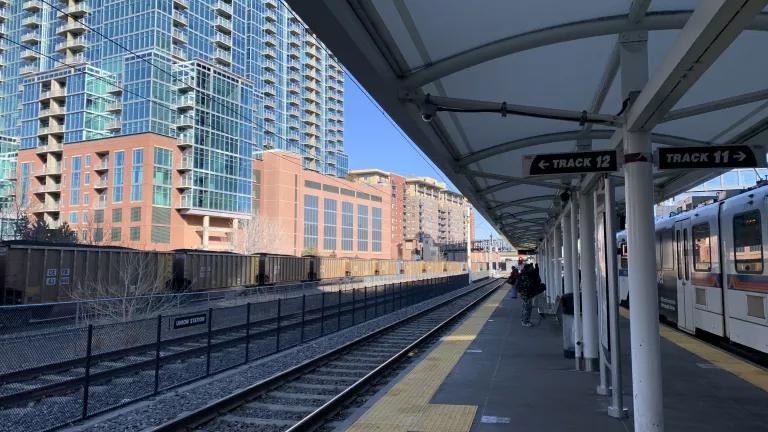Portland POEM Project Models Equitable Transportation Plans
As Americans readjust to life as our communities reopen, we’re unfortunately also seeing more traffic and tailpipe pollution. But Portland, Oregon, is looking to chart a different path forward.

POEM task force meeting, early 2020
As Americans readjust to life as our communities reopen, we’re unfortunately also seeing more traffic and tailpipe pollution.
But Portland, Oregon, is looking to chart a different path forward. Since 2019, a volunteer community task force has met monthly to explore a question cities around the world are asking: Can we adjust the price of transportation to better reflect its cost to the climate and to people—and bring more justice to a system that has left many communities behind?
On October 13, Portland's City Council unanimously approved the recommendations of their task force, passing a resolution that called for specific policies to do just that.
At the hearing, public comment was unanimously in support as well. Commissioner Jo Ann Hardesty summed up much of it in her own comments before voting “aye”:
“People are used to using the roadways for free. But there is a cost. That’s why we have a $4 billion maintenance backlog. There is a cost. That’s why we have high asthma and other health issues.”
(Watch or listen to the Council meeting on Portland's YouTube channel.)
To get to this point, the city created a deliberate process to involve the community and, together, they moved forward steadily, even amid a pandemic. It’s a model for climate action that prioritizes equity—not just in the destination, but also in the journey.
Clearing the air
The Bloomberg Philanthropies American Cities Climate Challenge is supporting Portland and several other cities in exploring a powerful tool to cut greenhouse gas emissions: congestion pricing. This usually requires drivers to pay a fee to enter the central city during the busiest hours of the day, and then the city uses that funding to improve public transportation or build out bike lanes and better sidewalks and crossings—leveling the playing field for more sustainable modes of transportation.
Already in effect in cities like Stockholm, London, and Singapore, the idea is still new in the U.S. New York City approved it in 2019 and is implementing its program, which will be the nation’s first. The cities with existing programs have seen significant drops in carbon emissions and much cleaner air. In Stockholm, the program resulted in a 47 percent drop in children’s asthma attacks.
Now, especially during and after the Covid era, many cities are broadening their perspective on pricing. While still considering downtown congestion pricing, other mechanisms may include assessing more of the true cost of parking, deliveries, and ride-hailing services like Lyft and Uber—which all increase driving and add to traffic and air pollution.
Targeting transportation, putting equity first
Transportation is the largest source of climate pollution in the United States, largely from cars and trucks. It’s also one of the biggest sources of emissions that cities can do something about: in Portland, transportation accounts for 42 percent of the city’s greenhouse gas emissions.
To tackle those emissions, Portland took a thoughtful approach.
“The POEM project started with a premise that the system today is costing people more than they think, and those costs are not borne equitably,” says Emma Sagor, Strategic Performance Manager with the Portland Bureau of Transportation (PBOT), in a recent conversation. Sagor is the co-project manager, alongside Shoshana Cohen, PBOT’s Intergovernmental Affairs Manager, of the Pricing Options for Equitable Mobility, or POEM project.
That’s because the transportation system, both nationally and in Portland, strongly favors driving over all other ways to get around. It also favors some people over others: the racist history of transportation decisions includes redlining to keep people of color out of certain neighborhoods (and often farther from jobs), freeways built through Black neighborhoods, and much more. This manifests today in Portland in many disparities:
- 27% of Black households in Portland do not have access to a car, compared to just 14% of white households.
- Average commute times are 20% longer for Black Portlanders than white Portlanders.
- A greater proportion of BIPOC (Black, Indigenous, and People of Color) Portlanders rely on city buses, which have slowed down—by 14 percent from 2000 to 2019.
- People who live in more racially diverse neighborhoods of Portland experience diesel pollution levels 100-200 percent higher than people in other parts of the city.
- The most recent average death rate from traffic crashes among Black Multnomah County residents was almost twice the rate of white residents.
A model process
Portland city staff and residents wanted to make sure that any policy tackled these inequities, and they used a process that itself modeled prioritizing equity and inclusion.
Two city departments put out a call for community volunteers and got over 130 applications. The resulting Pricing Options for Equitable Mobility (POEM) task force included 19 community members representing a diverse range of perspectives and backgrounds. The local group Verde, with support from the Climate Challenge, provided facilitation support and strategic advice.
The group first drafted an Equitable Mobility Framework, with inspiration from the Greenlining Institute’s, then used this to guide conversation and analysis, explore trade-offs, and inform decision making.
The group convened monthly (mostly virtually) to hear from experts, explore case studies and use their framework to analyze a range of pricing tools—including parking pricing, fees on commercial transportation services (like delivery vehicles or Uber and Lyft), highway tolling, cordon pricing and pay-per-mile road-usage charges.
Recommendations for action
In late summer, the task force finalized its recommendations for city leaders, and now the City Council has accepted them unanimously and directed staff to come back with specific policy proposals by June.
The near-term recommendations include:
- Create a flexible commuter benefits program to help incentivize workers to commute without driving
- Create new parking districts for meters and permits and make this easier so the city can respond to neighborhood parking demand.
- Assess a fee on privately owned off-street parking lots.
- Assess a fee on urban delivery (e.g., Amazon, GrubHub, etc.).
- Modify fees on for-hire transportation (like Uber and Lyft).
- As a City, advocate to change the Oregon state constitutional restriction that limits use of funds from taxes on motor vehicles (now just for road building and maintenance, not more transportation options). Also advocate with the state transportation department for the task force recommendations to use highway tolling to manage transportation demand for climate and equity.
While congestion pricing is still on a longer time horizon, all these steps will help to better reflect the true cost of driving, and support better alternatives. We look forward to seeing the City take these actions—and more—soon.



